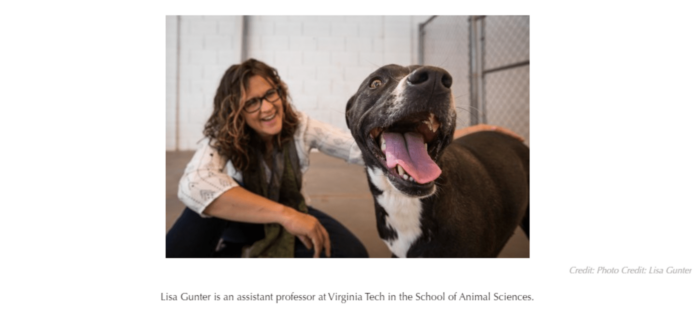Newswise — Bulldogs, pugs, and boston terriers all have one thing in common – their short snouts, and experts say as climate change worsens, they are going to suffer. The reason, as Lisa Gunter, an assistant professor in the School of Animal Science at Virginia Tech explains, comes down to science.
“One of the biggest challenges brachycephalic dog breeds face, wherever they live, is their restricted ability to thermoregulate,” says Gunter. “Unlike people that sweat as our primary way to stay cool in the heat, dogs pant.” She notes that brachycephalic dog breeds commonly have narrowed nostrils, elongated soft palates, and narrowed windpipes. “These physical limitations make breathing difficult, causing these breeds to be particularly susceptible to heatstroke more so than other dogs in surprisingly mild weather and humidity.” Struggling to breathe can also limit the amount of oxygen in the bloodstream, straining the hearts of brachycephalic dogs and making them more susceptible to heart problems.
“All dog owners, but especially those of brachycephalic dog breeds, have to be incredibly careful about the most quintessential dog-owner activity in extreme heat: dog walking.” Gunter, who spent nearly a decade in Phoenix, Arizona, saw these challenges for pets and their owners first-hand. Climate experts say that this type of heat will continue to become our new normal; and when air conditioning isn’t readily available, it could turn deadly for these breeds.
“Owners of brachycephalic dogs need to be much more aware of the heat and its devastating effects than typical dog owners,” says Gunter. “Seemingly routine activities with brachycephalic dogs, like a mid-day potty break in the backyard or coming along on a car ride, can be deadly in extreme heat if they’re accidentally forgotten about or closed in a space without air conditioning for just a few minutes.”
Gunter recommends that dog owners pay close attention to the time they schedule walks, where they walk, and how long the walks are. “That becomes essential as does carrying water, no matter the outing’s duration,” says Gunter.
These breeds already have a short life-span, making it more challenging. Gunter recommends pet owners do what they can to help their dog maintain a healthy weight. “Excessive weight, which is something that can easily accumulate on brachycephalic dogs, and can be exacerbated if they’re overfed and/or under-exercised.” It’s also important to identify possible breathing problems that need veterinary attention. “For dogs with moderate to severe breathing problems, surgery may be necessary to widen their nostrils and shorten their soft palate for better breathing.”
For those considering a brachycephalic breed, rescues are a great way to help dogs in need. If you want to acquire your dog from a breeder, Gunter says it is important to do your research. “Good breeders should have their dogs screened for brachycephalic obstructive airway syndrome (BOAS) and not be breeding those individuals that exhibit BOAS symptoms.”


